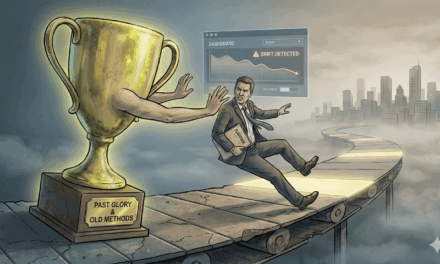
What The Tech Industry And Railroads Have In Common

I am going to tell you that you may not want to hear—something that few are saying out loud. Your job in technology may be ending soon. We are in the midst of both an evolution and a revolution. If you’re concerned about your future and the future of the technology industry, read on.
From 1863 to 1900, hundreds of thousands of workers built the U.S. railway system. As the network of railways expanded, employment in the industry grew to 1.2 million by the early 1900s, peaking further during World War II. But as technology evolved—with planes, personal automobiles, highways, and trucks replacing rail as the primary mode of transportation—jobs in the industry began to decline.
Today, only about 135,000 people remain employed in U.S. rail transportation. As the U.S. Department of Labor and Statistics notes, factors like the adoption of Precision Scheduled Railroading (PSR) have accelerated this decline.
After the completion of the railroad, many workers found themselves suddenly unemployed. Some transitioned into new roles in railway maintenance, as Conductors, and in station operations. Others settled down and built businesses reliant on the railways, such as hotels and manufacturing plants. The lesson? Industries evolve, and those who don’t adapt put themselves at risk of being left behind.
The Industrial Revolution continually evolved, growing and displacing workers while simultaneously creating new opportunities. Blacksmiths and carriage builders became mechanics. Tailors and shoemakers pivoted into sales. Factory workers transitioned into new trades, and their children became Computer Programmers.
I entered the tech industry 30 years ago, during the shift from mainframes to client-server computing. The commercial mainframe business had been thriving for about three decades, with Boston-based companies like Digital, Wang, and Bull HN employing tens of thousands. By 1999, Digital and Wang were gone. Bull was sold overseas, and nearly everyone lost their jobs. That industry lasted about 45 years before it collapsed.
Then came client-server, which was overtaken by cloud computing. By 2008, client-server was effectively obsolete. That cycle lasted just over a 10 years.
Now, here we are in 2025. The tech industry has shrunk, and hiring is at its lowest point in six years (except for the COVID peak). These jobs aren’t coming back anytime soon ( see chart) . As I write this, Salesforce, Workday, and Meta are collectively laying off around 7,000 employees in just one week.

Railroad workers played a crucial role in building the American industrial complex. Each new industrial revolution has created wealth for some and disintermediated others. That’s where we stand today. Some will get rich, while many will not.
If you want to remain in the industry and thrive, here’s what you need to do:
- Master Your Domain
- Whatever your role—Sales, Customer Success, Finance, HR—consume as much content from experts as possible to become an expert yourself.
- Understand how AI will impact your job and learn how to leverage it to your advantage.
- Become an Industry Expert
- As examples, if you work in hospitality tech, know occupancy rates, trends in business and leisure travel, and room turnover metrics like a CEO would. If you work in transportation tech, understand driver retirement rates, fuel costs, the rise of electric and autonomous vehicles, and logistics challenges.
- Find a Mentor or Advisor
- Whether you’re just starting out or are a CEO, you need at least one person who will offer honest feedback about your strengths and areas for improvement.
- Recognize When It’s Time to Move On
- Your job is your business. If your company is failing for reasons beyond your control, no amount of effort will change that. Your first loyalty should be to yourself and your family—not your employer. Otherwise, your job is to build your company even when it gets hard.
If you commit to these steps, you won’t just survive—you’ll thrive. The truth is, there is always money for expertise.
Good selling!



































